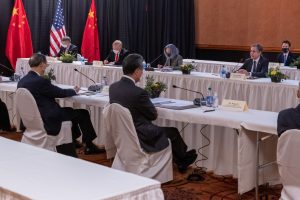By Sara Hsu

A couple of weeks ago, I wrote that in order to address issues that brought about the China-U.S. trade war, the countries should “carefully address these issues through a series of meetings between the U.S. and China.” I still believe that, but it’s getting more complicated by the day. After the Alaska meeting, which went awry during opening remarks, the relationship seems to be moving further apart. The United States announced sanctions on two Chinese officials involved in the repression of the country’s Uyghur Muslims, while moving closer to India militarily.
One reason that I have written about the necessity of talks is that there is a need to negate the anti-Chinese rhetoric that was so pervasive during the China-U.S. trade war under former President Donald Trump. For example, Trump referred to COVID-19 as the “China plague” and said that China has “ripped off the United States like no one has ever done before.” This rhetoric has led to a rise in anti-Asian bigotry and hate crimes in the United States in particular. It has also inflamed China’s government officials and foreign relations experts across the nation. As a result of the anger generated by this rhetoric, the populace in both China and the United States has become polarized against the other nation. A new series of talks, and more productive types of speech, need to be put into play to set the stage for real agreement between the two countries.
That being said, talks are necessary but not sufficient step for repairing the China-U.S. relationship. Before the China-U.S. trade war, few American firms had any illusions about the challenges of going into China: their IP could be stolen, or they could be exposed to data security breaches. However, at the time, it seemed there might be a way to work out these disagreements diplomatically. Four years into a messy trade war, in which the United States has lost $316 billion, it appears that this may not entirely be the case. There are two major reasons for this.
One, even though officials have addressed the issue through passage of new rules, China does not seem to recognize that it has a problem with the theft of intellectual property. Chinese officials have denied that China has a state-backed program to steal intellectual property and technology. Even where China attempts to combat IP infringement, officials must confront a legal system that enables intellectual property theft.
Second, China has an altogether different view of data protection and privacy. Despite the recent release of the Personal Information Protection Law draft, China continues to allow government entities the ability to collect data in order to maintain public safety, and the government has the authority to force firms and individuals to cooperate in giving up their own data. This is why it has been necessary for the United States to ban high-technology firms, from drone makers to chip producers, from selling their products and/or operating in the U.S. The United States cannot be assured that such firms are not collecting information on behalf of the Chinese government.
What this means is that talks are necessary in order to improve relations between the United States and China, but it must be recognized that they are only the backdrop to a larger solution to the political-economic friction between the two countries. These IP and tech-related issues, in addition to other issues such as human rights abuses and military coercion, need to be constructively addressed.
So far, the United States has gotten it right in reaching out to European and Asian allies to ensure that it has political backing in its dealings with China. Washington needs to do more, however. The trade war was premised on the idea that a trade surplus is bad, which is economically false. The Phase One trade deal reflected this in its requirements for China to purchase more agricultural, energy, and manufactured products as well as services from the U.S. Overall, the ongoing tariffs have harmed the U.S. especially, and have been insufficiently effective in enforcing the trade deal in the face of the COVID-19 pandemic and other constraints. Could the U.S. scale back tariffs to reduce harm to its domestic economy and then use the purchase requirements as a bargaining chip to bring China to the table on these more important issues?
There may not be a clear resolution to issues on which the two countries clearly disagree. The United States and China have altogether different views of data privacy, for example; can the countries agree to disagree while disengaging in a non-hostile manner on data sharing and technology? Can the U.S. and China negotiate the more difficult issues using bargaining tactics? No matter what the final outcome is, the first stage of any of these negotiations is a series of formal talks and more engagement, not less.
No comments:
Post a Comment